Why India is 'rightfully' calling for permanent removal of J&K issue from the UN; Facts and Events from history that Pakistan hates to admit
05 Sep 2020 22:26:18
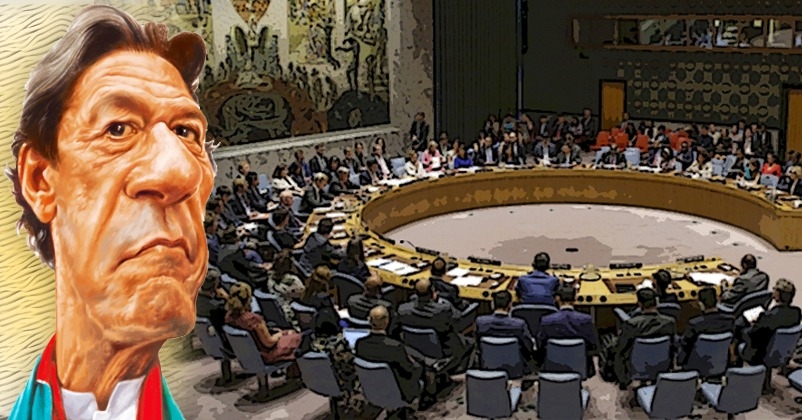
Reacting to India's call at the UN for permanently removing the issue of J&K under the “outdated agenda item” of the India-Pakistan Question from the Security Council's agenda early this week, Pakistan's Foreign Office spokesperson Zahid Hafeez Chaudhari on Saturday said that "India-Pakistan Question will remain on the agenda of UNSC until Kashmiris are granted their inherent right to self-determination through a free and impartial plebiscite under UN auspices as guaranteed to them by relevant UNSC Resolutions". Pakistan alleged that '‘India-Pakistan Question’ is one of the oldest items on UNSC agenda. The Question remains on the agenda since India has never implemented UNSC Resolutions on J&K dispute and India continues to deny Kashmiris inalienable right to self-determination enshrined in UNSC Resolutions’. On the contrary to what Pakistan FO has claimed, Pakistan apparently needs to retrieve from historical facts that no matter how repeatedly it seeks to have a discussion on the issue of J&K in the security council, Pakistan has only been able to bring up the issue informally and in closed-door meetings under what is called "Any Other Business", a category where literally any item can be brought for discussion by anyone. These meetings have ‘no records’ and there is ‘no outcome’.
India, early this week at the UN called for permanently removing the issue of Jammu and Kashmir under the “outdated agenda item” of the India-Pakistan Question from the Security Council's agenda saying such "irrational exuberance" has no takers in a dignified world. In a veiled attack on Pakistan, India without naming the country said “there is a delegation that repeatedly attempts to rebrand itself as contributing to international peace, but unfortunately fails to recognise that it is globally known for being the fountainhead of international terror and the hub for terror syndicates.” This delegation (Pakistan) keeps pushing for discussions on an “outdated agenda item” in the Council, which for all matter needs to be removed from the Council's agenda permanently. Such irrational exuberance has no takers in a dignified world, India said on the report of the Security Council for 2019.
An August 3, 2020 summary statement by the Secretary-General of matters of which the Security Council is seized listed 'The India-Pakistan Question' among those items that have not been considered by the Council at a formal meeting during the period from January 1, 2017, to August 1, 2020. Pakistan's UN envoy Munir Akram had raked up the issue of J&K during a virtual informal meeting of the plenary on the annual report of the Security Council, saying that “the Security Council has been found lacking in implementing its own resolutions and decisions on the situation in J&K and has met just thrice during the last one year to consider the situation.”
The agenda item ‘India-Pakistan Question' was first taken up by the Council at a formal meeting on January 6, 1948 and was last considered on November 5, 1965. Pakistan backed by its all-weather ally' China has been repeatedly seeking to have a discussion on the issue of J&K in the Security Council.
India's Permanent Representative to the UN Ambassador TS Tirumurti told PTI that contrary to what Pakistan may claim, Islamabad has not been successful in trying to put J&K on the UN agenda. He pointed out that contrary to what the Foreign Minister of Pakistan Shah Mehmood Qureshi asserted, there has been no formal meeting of the Security Council on the India-Pakistan issue even once for the past 55 years, let alone three times!
If we go back in history, there is sufficient documentary proof to maintain that it was the Government of India that came to the Security Council in the first instance on 1st Jan 1948 under Article 35 of the Charter of the UN which means that India did not approach UN with a request for drastic action. The provision invoked mentions -"any Member may bring any situation" and the word "situation" means India did not bring a dispute but a situation to the attention of the Security Council -"whose continuance is likely to endanger the maintenance of international peace and security. A situation that exists between India and Pakistan." However, Pakistan tried to claim through its representative that Pakistan and India approached UN over a ‘dispute of territory’. The representative of Pakistan attempted to convey to the Council the feeling that there was a crisis developing in this matter.
As per the UN Charter, India brought a ‘situation’ in notice of the UN not a ‘dispute about territory’. The ‘situation’ was “aggression by Pakistan” against India which was the only basis and the starting point of the complaint made by India to the UN.
While Pakistan always tried to establish that India and Pakistan (both) approached the United Nations over ‘a dispute about territory’ and projected the accession of Jammu and Kashmir to India as ‘spurious’ to strengthen its case, India’s actual complaint to the UN was for an “act of aggression” by Pakistan against India. In its complaint, the GOI had mentioned “the Government of India requests the Security Council to call upon Pakistan to put an end immediately to the giving of such assistance ...which is an act of aggression against India. Thus, the “act of aggression against India" is the crux”.
Although, Pakistan avoided point of Aggression which was the ‘starting point’ for India to approach UN, taking responsibility to highlight it, India warned that if Pakistan took no steps to halt the aggression, India will exercise its right, as a member of UN, to attack Pakistan in self-defence.
As the documentary evidences have it, Pakistan was involved in the act of invasion against India and this had begun by 10 October 1947, i.e., prior to accession of the State to the Union of India:
On 4 Sept, on the basis of a telegraphic report submitted by its Chief of Staff, Major-General Scott, the Kashmir Govt. protested by telegram to the West Punjab Govt. against armed Muslims from Rawalpindi district infiltrating into the State. Protests were also made to the Deputy Commissioner. Two days later there was a marked increase in this activity.
On 13 Sept, a Pakistan Army patrol visited Alibeg and Jatlai, fourteen miles west of Bhimbar, both in the State territory. They are all contained in the diary kept by General Scott. On 17 Sept, (only one month from independence) a band of 400 armed raiders, twelve miles southeast of Ranbirsinghpura drove away herds of cattle belonging to State nationals.
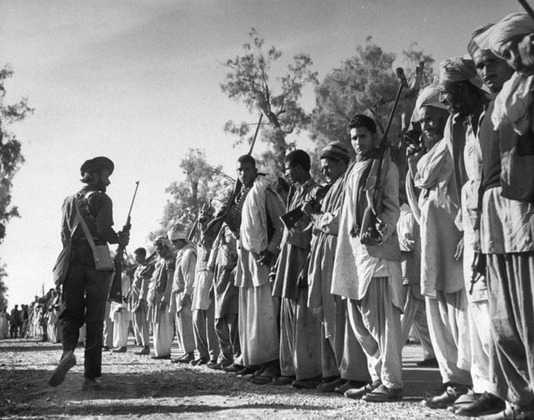
Pathan tribesmen led by Pakistani armtmen waiting for trucks and more ammunition as they prepare to go into battle: MARGARET BOURKE-WHITE/THE LIFE PICTURE COLLECTION
On 18 Sept, when essential supplies were cut, this action of economic blockade was not isolated. Armed gangs entered Kashmir in Palandri (Poonch), across the State border. Thus, by 18 Sept, the invasion had gained momentum. On 28 Sept, hundreds of armed men with service rifles, automatic and spears attached in Kashmir State patrol near Chak Harka. On 30 Sept, hundreds of armed Pathans entered Dhirkot than inside the State territory.
On 3 Oct, the J&K Govt. protested telegraphically to Pakistan against hundreds of armed people from Murree Hills in Pakistan operating in Poonch-part of which is now occupied by Pakistan, part of which is in the other side; it also protested against the essential supplies, including petrol, rice, salt and cloth, being withheld. That is the second violation of the standstill agreement.
On 4 Oct, armed men renewed their activities in the Chirala area and near the Jhelum river and fighting between the raiders and State forces began. The things had reached a state of war. On 10 Oct, two sections of the Pakistan Army followed by an armed gang attacked Pansar village in Jammu. So, on 10 Oct 1947, the invasion began. And here as mentioned in the diary, two sections of the Pakistan Army followed by an armed gang attacked the village. And this item appeared in the Pakistan papers, "The North-West Frontier Province Premier is reported to have announced that fire-arms would be distributed among the people liberally so that all except the 'enemies of Pakistan' can have them" (S/PV.762/Add.1, annex 1, No.12).
On 15 Oct 1947, the Maharaja appealed to the British PM through cable about the economic blockade on the State by Pakistan and the beginning of the invasion from Pakistan in Poonch.
Some days later, on 22 Oct, the J&K Prime Minister telegraphed the Prime Minister of the North-West Frontier Province-that is, a province of Pakistan-and the Deputy Commissioner of Rawalpindi, both in West Pakistan, about people armed with modern weapons infiltrating from Hazara and Rawalpindi district in West Pakistan into the State and asked them to stop the infiltration. The invaders continued their progress along with Jhelum Valley road towards Srinagar, these men were resisted only by the national militia, by the local populations. They were not welcomed as liberators. They fought a last-ditch battle; they resisted these people. That was on 22 October.
On 24 Oct, the Maharaja, who was the head of the State, appealed to India for military help.
On 25 Oct, Lord Mountbatten attended the Defence Committee at which General Lockhart, the Commander-in-Chief in India, read out a telegram from the headquarters of the Pakistan Army stating that some 5,000 tribesmen had attacked and captured Muzaffarabad and Domel and that considerable tribal reinforcements could be expected. Reports showed that they were already little more than thirty-five miles from Srinagar.
On 26 Oct 1947, the Maharaja asked for protection and he offered accession to India.
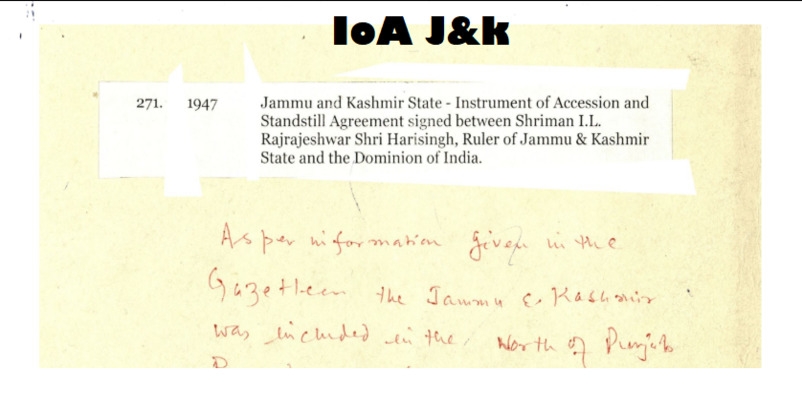
Even after the accession of Jammu and Kashmir to India, the acts of aggression continued on the part of Pakistan.
On 22 Dec 1947, in Delhi, the PM of India handed over to the PM of Pakistan a letter requesting the Govt. of Pakistan to deny to raiders (1) all access and use of Pakistan territory for operation against Kashmir (2) all military and other supplies, and (3) all other kinds of aid that might tend to prolong the struggle.
The Prime Minister stated that there could be no doubt whatsoever that all these invaders had come across from Pakistan territory. He said: "We have a right to ask the Pakistan Govt. how and why these people could come across the Frontier Province or West Punjab, and how they have been armed so effectively. Is this not a violation of International Law and an unfriendly act towards a neighbour country?" The PM continued: "Is the Pakistan Govt. too weak to prevent armies marching across its territory to invade another country, or is it willing that this should happen? There is no third alternative."
India’s approach to the UN Security Council and the basis of India’s complaint. Also, the political importance of the matter.
Although, in spite of what was going on, the Govt. of India was still trying to settle matters and attempting not to have a repetition of what had happened in the previous months in the north-west of India and the north-east of Pakistan.
Drawing the attention of the Council to 22 Dec 1947, the documentary proofs support that India waited one week before coming to the Security Council. Nothing happened after 8 days. India would not have come to the Security Council if any improvement had taken place. On 1 Jan 1948, India complained to the Security Council under Article 35 of the Charter. Even then India did not come here with the idea of using international forces to restrain, or impose economic sanctions, or remove Pakistan from its seat in the assembly, or anything of that kind. India came to the Council to complain to the Security Council under Article 35 of the Charter, requesting that the Govt. of Pakistan be asked to prevent tribal and Pakistan nationals from taking part in the fighting in the State of J&K and to deny to the raiders access to and use of its territory in operations against Kashmir, military and other supplies, and all other kinds of aid that might tend to prolong the fighting in Kashmir.
The most respectable of the journals of the world, that is, the London "Times", on 13 Jan 1948, that is, twelve days after India came to the Security Council, stated: "That Pakistan is unofficially involved in aiding the raiders is certain”. The "Times" went on to say that a few Pakistani officers were also helping to direct their operation and that, however much the Pakistan Govt. might disavow (deny) intervention, ‘moral and material support’ was certainly forthcoming.
At the end of October and beginning of Nov 1947, independent evidence were offered by London newspapers which in no way could be regarded as being disposed too favourably towards India in these matters at that time. Alan Moorehead, correspondent of the London ‘Observer’ in Pakistan, wrote as follows: "The Pakistanis look on this as a holy Muslim war. Some of them I have seen talk widely of going to Delhi." Alan Moorehead motored to Peshawar and the Khyber Pass from where this crusade began. He wrote: "Everywhere recruiting is going on... This is happening not only in the tribal territory....but inside Pakistan itself" There is also photographic evidence. An Associated Press photographer, presumably an American, flew over a section of Kashmir and said on 3 Nov 1947 that he saw more than twenty villages in flames.
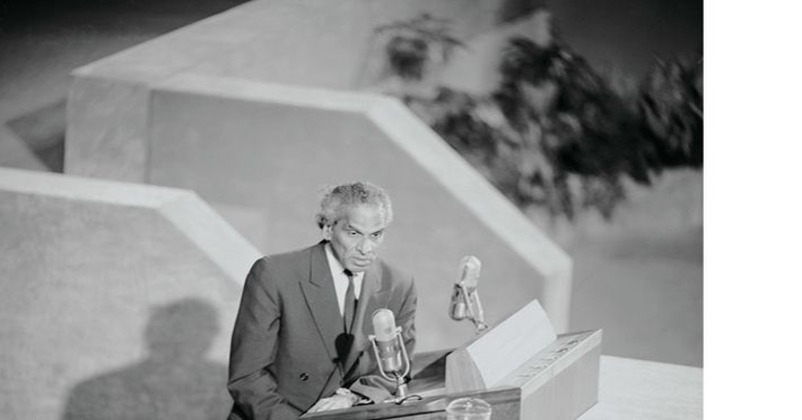
V.K. Krishna Menon at UNSC
The political importance of the matter is that if the Kashmir territory was aligned with Pakistan by kinship, by links of blood, race or religion, that was a strange way of showing the friendship-by invading its country, and the rapine and plunder of the raiding forces continued up to Baramulla, which is only a few miles from Srinagar. The town was sacked and burned.
Both in the municipal laws of many countries and in international law, aiding and abetting either before or after the fact is participation in the act itself. Even if it be assumed that there was not participation of the regular army, as it was suggested that there could not be, according to the "Times" correspondent, if there was no intervention, there was “moral and material support”.
How the situation of aggression was further substantiated by the Pakistan’s Reply dated 15 Jan 1948 to India’s Complaint (and later by the UNCIP).
Pakistan filed its reply on India’s complaint on 15 Jan 1948. The main content of Pakistan’s reply was denial of all the charges. Pakistan in fact put some counter charges on India which is against international law. It tried to deviate the Council by making such counter complaints against India. But Pakistan’s denial was disproved by the United Nations Commission.
Pakistan denied aggression. The letter from the Minister of Foreign Affairs of Pakistan to the Secretary General of the United Nations dated 15 Jan 1948 says: "Pakistan Govt. emphatically deny that they are giving aid and assistance to the so-called invaders or have committed any act of aggression against India." The document continues: "On the contrary and solely with the object of maintaining friendly relations between the two dominions, the Pakistan govt. have continued to do all in their power to discourage the tribal movement by all means short of war." So, there is a total, straight denial. They deny they are giving aid and assistance to the "so-called" invader, or that they have committed any act of aggression.
The United Nations Commission for India and Pakistan (UNCIP), however, established Aggression by Pakistan and in the first interim report said: "Another element, the significance of which had not been fully appreciated before the Commission's departure from the sub-continent, was the 'Azad" Movement which constitutes an organized political and military body, is assisted by the Pakistan High Command, and is engaged in active revolt against the existing Government. This Movement has cooperated since Oct 1947 with invading tribesmen and individual Pakistani nationals"(S/1100, para 125).
Meanwhile, India made a modest request in its complaint to the Security Council and came with clean hands to the Security Council. In the letter that was put before the Security Council, the answer India gave was: "The situation in their view is due to the aid which the invaders, consisting of nationals of Pakistan and of tribesmen from territory immediately adjoining Pakistan from the north-west are drawing from Pakistan for operations against J&K, a State which has acceded to the Dominion of India and is part of India". That is quoted in the reply, which goes on to say: "They have requested the Security Council to call upon Pakistan to put an end immediately to the giving of such assistance which is an act of aggression against India. They have also threatened that if Pakistan does not do so, the Govt. of India may 'enter Pakistan territory, in order to take military action against the invaders'."
The UN Security Council Resolutions:
On 1 Jan 1948 India made its complaint. The Security Council met for the first time on 6 Jan 1948 and did some preliminary business. Pakistan filed its reply on 15 Jan 1948. On 17 Jan 1948, the Council adopted a Resolution.
The 1st Resolution dated 17 Jan1948: The Security Council recognized the urgency of situation, which India raised in its complaint (India’s point strengthened). It then called upon both the Govt. of India and Pakistan to take immediately all measures within their power (including public appeals to their people) calculated to improve the situation, to refrain from making any statements and from doing or causing to be done or permitting any acts which might aggravate the situation. And requested them to inform the Security Council immediately of any ‘material change’ in the situation which occurs or appears to either of them to be about to occur while the matter is under consideration of the Council, and consult with the Council thereon. However, violations by Pakistan continued.
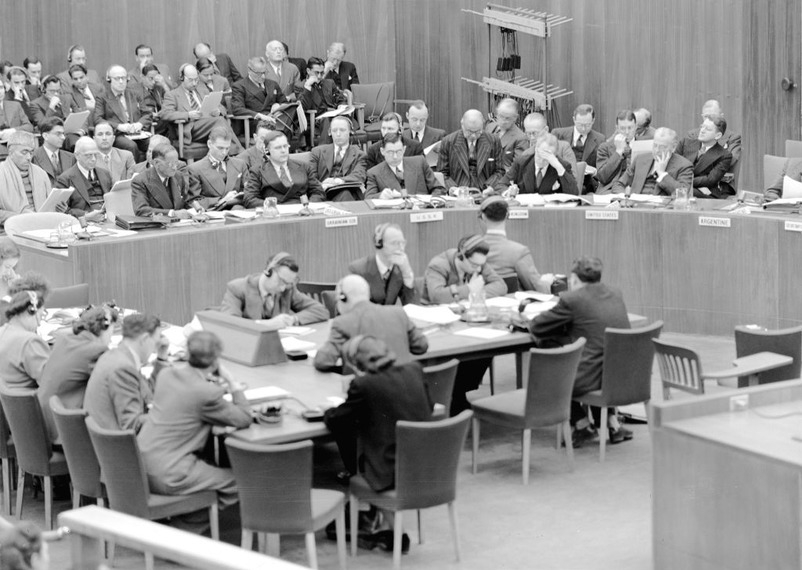
An Old Picture of UNSC meeting
The 2nd Resolution dated 20 Jan 1948: Establishment of United Nations Commission for India and Pakistan (UNCIP) for Investigation of Situation complained by India
On 20 January, three days later, the Security Council further considered that it may investigate any dispute or any situation which might, by its continuance, “endanger the maintenance of international peace and security”; that, in the existing state of affairs between India and Pakistan, which investigation is a matter of urgency. The Govt. of India accepted the Resolution of 20 January despite its undisputed and irrevocable claim to sovereignty over its territory, in view of the fact that the situation was likely to lead to difficulties, and because of its faith in the United Nations- then perhaps more fresh than it is today , but still a faith that is founded in the Charter and the recognition that, whatever, may happen in the intervening period, by and large, truth catches up.
Meanwhile, the fact does remain- and this is to be corroborated after- that the Commission did report that “there was aggression”, that “there was material change in the situation”- of which the Security Council was kept in the dark.
The 3rd Resolution dated 21 April 1948: It increased the number of members of UNCIP from 3 to 5. It was a modification and gave instructions about withdrawal of troops and holding of ‘plebiscite’. India rejected certain parts of this Resolution, however, expressing its willingness to receive and confer with the Commission as a gesture of courtesy. On 5 May 1948, the Govt. of India formally informed the Security Council of its rejection of certain parts of this Resolution, and that correspondence is contained in document S/734/Corr.I.
The Change of Title of India’s Complaint by the Security Council
The Security Council having adopted its resolution of 20 Jan 1948 went on to inquire about various things. Meanwhile the Security Council changed the title to the "India-Pakistan Question". India stated at that time that it had no objection to the use of any words which might be desired, but it maintained that the Kashmir question was the “subject of the complaint”.
The Commission met at Geneva on 16th June 1948 and the Commission’s Report clearly indicates that the Commission was more concerned about the immediate cessation of hostilities rather than to deal with specific provisions contained in Resolutions of the Security Council.
“The Bombshell” – Pakistan Exposed for Non-reporting of Material Change and violation of the Security Council Resolution of 17 Jan 1948
The presence of Pakistan troops in Kashmir, which had been denied all along by Pakistan, was admitted by the Foreign Minister of Pakistan to UNCIP which it recorded it in its Official Report. Pakistan had launched fresh offensive against India by sending troops to Kashmir even after the entrustment of the matter to the UNCIP. Apart from the offensive in the Western areas which was already on, Pakistan launched a considerable offensive in the Northern areas despite the injunctions of and the undertakings given to the Security Council that any “material change” in the situation should be reported.
First time the Pakistan Minister for Foreign Affairs and Commonwealth Relations, Mohd. Zafrullah Khan accepted while informing the UNCIP in Karachi that 3 brigades of regular troops of Pakistan Army are in Kashmir (sent into the State during the first half of May), which amounts to material change and Pakistan did not inform it to the Security Council. UNCIP regarded it as a “material change” in the situation and communicated to the Security Council through a confidential cable dispatched on 20 July. UNCIP made mention of it in its official report. The Commission adopted a Resolution requesting the Secretary-General of the United Nations to appoint a military adviser. As per Commission's findings, Pakistan had not informed the Security Council of the presence of its troops in Kashmir because at the time they had been sent into the state, the question had been entrusted to the Commission.
UNCIP accepted Indian Stand on Invasion by Pakistan and on India’s Right to Protect Jammu and Kashmir. Points raised by India found favour in Commission. It was accepted that invaders will have to go and if necessary, local authority will be there to maintain law and order not the Govt. Indian forces have the right and the duty to protect the state territory.
The Indian stand was based upon the idea of the “sovereignty of the State”, that is to say that it is indivisible, that its parts cannot be taken by invasion, that the Indian forces have the right and the duty of protecting this area and that the invaders must evacuate. That is the crux of the case: the invaders must evacuate the territory and, if it is necessary, there should be local authorities there -not governments but merely local authorities-for the maintenance of law and order under the supervision of the Commission. That was the position, as maybe seen from the Resolutions that were adopted later.
Paragraph 21 of Sir Owen Dixon's Report to the Security Council that recorded the view that Pakistan is an Aggressor and Violated the International Law
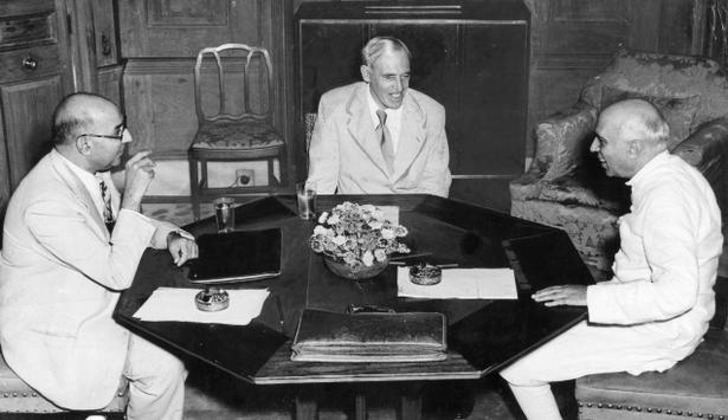
PM J.L. Nehru with Pakistani PM Liaqat Ali Khan and Sir Owen Dixon (Centre), Photo: The Hindu
Sir Owen Dixon was one of the investigators who, on balance, was not favourable to the Indian position and had a considerable number of reservations. Calling the attention of the Security Council to its primary concern for obedience to the Charter and the sanctity of the provisions of the Charter with regard to territories, the Paragraph 21 of Sir Owen Dixon's Report to the Security Council states: "Upon a number of occasions in the course of the period beginning with the reference on 1 Jan 1948 of the Kashmir dispute to the Security Council, India had advanced not only the conditions to which I have already referred that Pakistan was an aggressor, but the further contention that this should be declared. The Prime Minister of India, at an early stage of the meeting (the meeting with Sir Owen Dixon) made the same contention and he referred to it repeatedly during the conference. I took up the positions, first that the Security council had not made such a declaration; secondly that I had neither been commissioned to make nor had I made any judicial investigation to the issue; but thirdly that, without going into the causes or reasons why it happened, which presumably formed part of the history of the sub-continent, I was prepared to adopt the view that when the frontier of the State of J&K was crossed, on I believe 20 Oct 1947, by hostile elements, it was contrary to international law, and that when, in May 1948, as I believe, units of the regular Pakistan forces moved into the territory of the State that too was inconsistent with international law (S/1791. para 21).”
The UNCIP resolution of 13 Aug 1948 which Pakistan never intended to fulfill
The Commission, at its meeting on 13 Aug 1948 finally formulated the Resolution which forms the basis of the Kashmir question so far as the Security Council is concerned. This is the well-known Resolution of 13 Aug 1948 which brought about a ceasefire. This Resolution was referred to in the statement by the Foreign Minister of Pakistan at the 761st meeting, and India believed that in the interests of clarity and accuracy he ought to draw attention to it.
Misrepresentation of Resolution of 13 August 1948 by Pakistan
The representative of Pakistan stated: "The main provisions of this international agreement for a plebiscite are:
"(I) Cease fire and demarcation of a cease-fire line." -
"(2) Truce agreement providing, inter alia, for:.. (a) withdrawal of tribesmen and Pakistan nationals...(b) withdrawal of Pakistan troops and the bulk of the Indian Army ... (c) plebiscite to be conducted . . .
This clearly meant that in very first stage Pakistan had to vacate entire occupied area of Jammu Kashmir and hand it over to Indian Troops, In Second Phase all displaced residents of Occupied areas would settle in their own homes and then once pre-occupation situation is restored, Plebiscite process would be initiated this was the sequence of the resolution plan.
But Pakistan never showed any intention to follow the sequence process of first two stages. Here India’s role would have started in third stage after Pakistan vacated occupied areas which it never did. Ironically, Pakistan kept blaming India for not following UN resolutions which was never the case.”
The Correct View of the Resolution of 13 August 1948 presented by India
Correcting the misrepresentations made by the Foreign Minister of Pakistan and giving the accurate version of all the three consecutive parts of the Resolution of 13 Aug 1948, i.e., the cease fire, the truce agreement and the plebiscite, Indian delegation said that India had no quarrel with the cease-fire part. However, it emphasized that the Part of the Resolution referring to the plebiscite is not Part II but Part III of the Resolution. The plan of this programme is that, first, there should be a ceasefire, then there should be a truce agreement and then comes the third part. Part-III was conditional on the performance of Part-II. When Part-II did not happen, Part-III becomes infructuous.
Part I is concerned only with a cease-fire. It places responsibility on the High Commands of the Indian and Pakistan forces "to refrain from taking any measures". It establishes the cease-fire as between the two High Commands. The Govt. of India and the Govt. of Pakistan agree to appeal to their respective peoples to assist in creating and maintaining an atmosphere favourable to the promotion of further negotiations." Both the countries had to work for making conditions favourable for negotiations, but Pakistan never did it though cease-fire had taken place. India, however, fulfilled its commitment.
As per the documentary proof, Part II relates to the truce agreement. Withdrawal of Pakistani invaders from POJK and Handing over of its Administration to Local Authorities.
Paragraph 1 of Section A states that presence of Pakistan forces in the State constitutes a material change and Pakistan will have to withdraw its troops.
Paragraph 2 required that Pakistan will remove its nationals and tribesmen from J&K who had entered the State for the purpose of fighting. There has been no withdrawal of these nationals to the extent that is required in this matter.
Paragraph 3 states that territory evacuated by Pakistan will be administered by local authorities. This is an integral part of the conditions, and the principle for which India asked and which is incorporated by the Commission in its Resolution. But this part was also not implemented.
Section B: Withdrawal of Indian Forces ‘Conditional’ on Pakistan’s Full Withdrawal of its Forces. However, India withdrew but Pakistan didn’t. Paragraph 1 of Section B states that India will remove bulk of its forces when Pakistan will withdraw all of its forces, the tribesmen and Pakistan nationals. The withdrawal of Indian forces was made ‘conditional’ on the removal of all the forces by Pakistan (which was to be notified by the Commission to the Govt. of India).
Paragraph 2 recognized the fact that until the acceptance of the conditions, the security of the State is the concern of the Govt. of India. It states "Pending the acceptance of the conditions for a final settlement of the situation in the State of J&K, the Indian Govt. will maintain, within the lines existing at the moment of the cease-fire, the minimum strength of its forces which, in agreement with the Commission, are considered necessary to assist the local authorities in the observance of law and order." Paragraph 3 Section B further amplifies it : "The Govt. of India will undertake to ensure that the Govt.of the State of J&K will take all measures within its power to make it publicly known that peace, law and order will be safeguarded ..." India was given the responsibility for law and order and the responsibility for security. What is more, it was a condition that the Indian forces should withdraw only when all others had withdrawn, and the reason for bringing the case had disappeared. That is set out in section B. However, in spite of this condition in section B of the Resolution, India withdrew a considerable part of its forces in spite of the fact that the foreign nationals were there and in spite of the fact that the aggression had not been liquidated. Whereas Pakistan further increased the strength of its forces substantially.
This Part deals with the Plebiscite. The Resolution was not to conduct plebiscite but to enter into consultations for plebiscite which were rendered impracticable due to the conduct of Pakistan.
Under Part-III, both the Governments had to favour that future of the State will be determined as per the wishes of the people but only after the truce agreement is accepted. Part-III states: "The Govt. of India and the Govt. of Pakistan reaffirm their wish that the future status of the State of J&K shall be determined in accordance with the will of the people and to that end, upon acceptance of the truce agreement both Governments agree to enter into consultations with the Commission to determine fair and equitable conditions whereby such free expression will be assured." But the truce agreement was not signed as Pakistan armies had not vacated rather there were continued violations.
While Resolution of 13 August 1948 was not one that totally met India’s point of view, with a view to resolving the position the Govt. of India accepted this Resolution which was adopted by the Commission on 13 August. Resolution of 13 Aug 1948 was to be read with Assurances given to India by the UNCIP in pursuance to the Resolution. It was given in writing by the Commission to the Govt. of India. Those assurances were set out in a letter that was sent by the Prime Minister of India to the Commission on 20 August 1948.
Indian PM Jawaharlal Nehru’s letter to UNCIP dated 20 August 1948 regarding the Terms of the Resolution dated 13 August 1948 of the Commission which the Commission presented to him on 14 August 1948 [S/1100, para. 78]
In this letter, he reminded the Commission that Indian Govt. had placed the facts before it when it first came to Delhi that Pakistan’s unwarranted aggression on ‘Indian Dominion territory’ of J&K, first indirectly and then direct, is the major issue which Pakistan denied but this is a matter of common knowledge. In recent months, very large forces of the regular Pakistan Army have further entered Indian Union territory in Kashmir and opposed the Indian Army which was sent there for the defence of the State. This, as per India’s understanding now, is admitted by the Pakistan Govt., and yet there has been at no time any intimation to the Govt. of India by the Pakistan Govt. of this invasion. Indeed, there has been a continual denial and the Pakistan Govt. have evaded answering repeated inquiries from the Govt. of India. In accordance with the Resolution of the Security Council of the United Nations adopted on 17 January 1948, the Pakistan Govt. should have informed the Council immediately of any ‘material change’ in the situation while the matter continued to be under the consideration of the Council.
Pakistan forcibly and illegally occupied the territories of Chitral, Gilgit and Baltistan which are Part of India and Strategically Important for India. These territories were under the suzerainty of the Maharaja of Jammu and Kashmir who only had the power to accede them. Pakistan obtained accession of these areas from some functionaries who had no authority to accede them. So, the accession of these areas was obtained illegally by Pakistan and does not hold any ground at all.
India ably fulfilled the wishes of People of Jammu and Kashmir & Implemented Democratic Process/Elections
On 26 November 1949 India dully adopted its Constitution; In which under Article 1, Jammu Kashmir was 15th State of Union of India. Despite Pakistan’s clear refusal to implement UN resolution or to show any intention to resolve tensions between two countries; When the required withdrawal did not occur for years, People & Political parties of Jammu Kashmir started asking to initiate a democratic process in Jammu Kashmir.
On 1 May 1951 then Head of state of J&K Karan Singh issued a proclamation directing the formation of the constituent assembly. The assembly was constituted of elected representatives of the people of the state.
The proceedings of Constituent Assembly of the state on 6 Feb 1954 clearly mentioned that the J&K Constituent Assembly ratified the IOA in the favour of India. This Constituent Assembly had the representatives of the people of J&K who took the decision on the matter of Accession. Later on, the Constituent assembly prepared a state constitution under the ambit of the Constitution of India which was adopted and implemented on 26 November 1957. The first general elections were held in the state in 1957, after the dissolution of the Constituent Assembly, through a well-defined procedure for the same, and the democratically elected government was formed in J&K.
Here, noticeably, Lord Mountbatten, the then Governor-General of India mentioned that “there were four ways to ascertain the wishes of the people. These four ways were a referendum, plebiscite, election or even, if these methods are impracticable, by representative public meetings (Mission with Mountbatten by Alan Campbell-Johnson, p.263). India has already exercised the last two options, i.e. election in the state and representative public meetings, to ascertain the wishes of the people”.
Even Govt. of India was ready for the plebiscite provided that the two conditions preceding to plebiscite must be fulfilled. These two conditions were ceasefire by Pakistan and the withdrawal of Pakistani intruders from the soil of the state so that free and fair elections for the state can be ensured. But the first two conditions never fulfilled and the plebiscite, which was to ensure after the fulfillment of the two conditions, for the entire state, never happened. India waited for the international community to intervene in this matter and make a peaceful solution to the problems created by the Pakistani invaders, in this part of the country, but nothing happened in this matter. Therefore, on January 23, 1957 Mr. VK. Krishna Menon, the Indian representative to the UN, made it clear in the United Nations Security Council (UNSC) that J&K including POJK belongs to India only. That clearly means India had put its case to rest and made clear to UN & Pakistan that the issue of Jammu Kashmir is dead for India.
Shimla Agreement: The final nail in the coffin of "Jammu Kashmir Issue in UNSC".
After the 1971 India-Pakistan War, the Shimla Agreement was signed by Prime Minister Indira Gandhi and President Zulfikar Ali Bhutto of Pakistan on 2nd July 1972. It was a comprehensive blueprint for good neighborly relations between India and Pakistan. Under the Shimla Agreement, both countries undertook to abjure conflict and confrontation which had marred relations in the past and to work towards the establishment of durable peace, friendship, and cooperation.
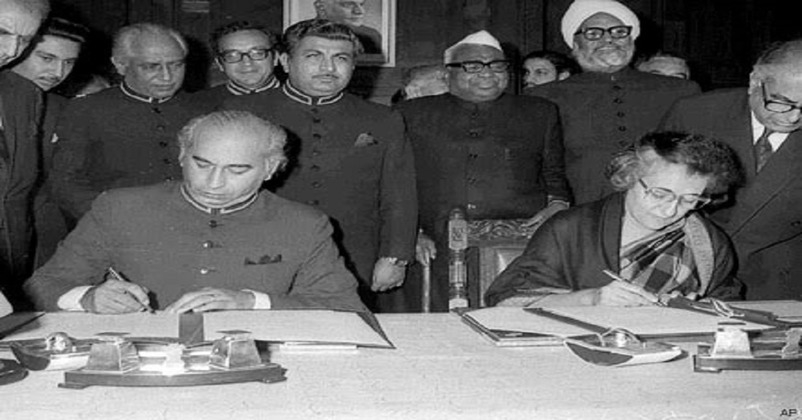
Pakistani PM Bhutto & Indian PM Indira Gandhi signing Shimla Agreement
In this agreement both countries mutually agreed upon that any differences would be resolved peacefully and bilaterally, no other party would come in between. That was the final nail in the coffin of "Jammu Kashmir Issue in UNSC". Shimla Agreement says: "That the two countries are resolved to settle their differences by peaceful means through bilateral negotiations or by any other peaceful means mutually agreed upon between them. Pending the final settlement of any of the problems between the two countries, neither side shall unilaterally alter the situation and both shall prevent the organization, assistance, or encouragement of any acts detrimental to the maintenance of peaceful and harmonious relations."
In later years both countries maintained the guiding principles of this agreement, which was respected by each and every country or Organization including all UNSC members and the UN itself.
On 8 Sept 2004, after a meeting between the External Affairs Minister of India, K. Natwar Singh, and the Foreign Minister of Pakistan, Khurshid Mohammed Kasuri, then UN Secretary-General Kofi Annan had said in an official statement that “the two South Asian officials reviewed the process of the composite dialogue between their countries. He is heartened that the two sides continue to make steady progress towards resolving outstanding issues and improving their bilateral relations, emphasizing that success would benefit not only the lives of the peoples of the two countries but also regional and global stability. The Secretary-General encouraged the leaders of India and Pakistan to pursue their efforts "with patience and a spirit of compromise in addressing the various issues, including the question of Jammu and Kashmir."
When the UN reminded Pakistan that the issue of Jammu Kashmir in UNSC is null & void:
Later on, in 2005, then UN secretary-general Kofi Annan declared that the 'plebiscite' issue could not be enforced or self-implemented, as it was a dead issue. Clearly it is evident that the UN also kept considering it an irrelevant/non-existent issue. During this period Pakistan used to put its entire weight to keep Jammu Kashmir's issue in the Annual UN report, but the UN kept dropping it out of the report.
The UN Council had held closed consultations on the issue of J&K on August 16 last year after China asked for the "closed consultations" to discuss the matter but that meeting had ended without any outcome. In January this year, China, on behalf of Pakistan, had again made an attempt to raise the Kashmir issue under "other matters" during closed consultations in the Security Council Consultations Room. Yet again, China stood alone for Pakistan to get the Council to focus on the Kashmir issue. Last month, as India marked the 1st anniversary of J&K’s bifurcation into two union territories, Beijing again called for a discussion on the issue in the Security Council under 'Any Other Business'. However, all these meetings ended without any outcome, as many other members of the Security Council have underlined that “J&K is a bilateral matter between India and Pakistan”.
India has always taken the position that there was no dispute over territory but a complaint about aggression. The Govt. of India had objected and will continue to object to the discussion of this problem in any international forum other than the Security Council, which is seized of it. There had been participation by the UK, the US, China, France, Iraq, the Philippines, and various other countries along with Pakistan in attempts to raise this matter, in a however superficial way, in other forums, and India has on each occasion protested to each government and said that it was the wrong action to take. India continues to do so, irrespective of the responses they make.
As pointed out by India's Permanent Representative to the UN Ambassador TS Tirumurti, that “even the UN Secretary-General Antonio Guterres, in his statement last August, clearly referred to the 1972 bilateral Shimla Agreement”. Consequently, Pakistan has been singularly unsuccessful in making any inroads into the UN on Jammu and Kashmir. And that is the reality.
(Ina Siwach, the writer is a digital media professional having an experience of 10 Years in broadcast & digital)